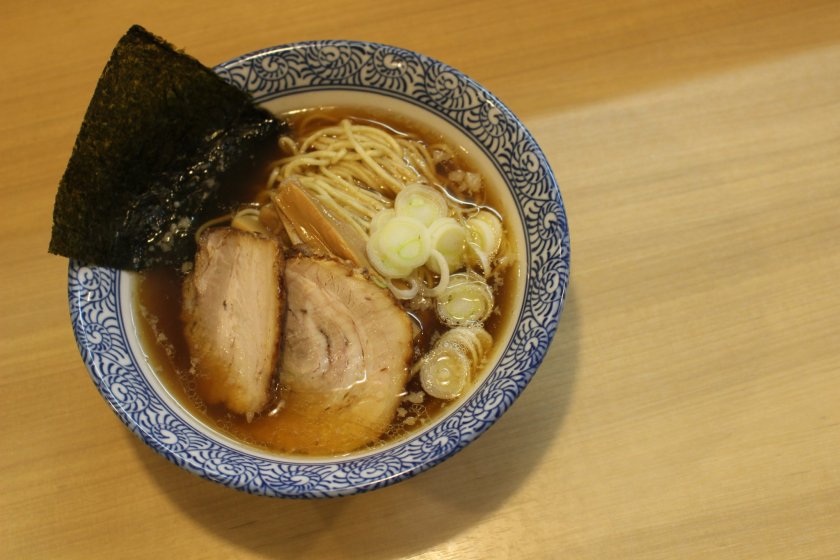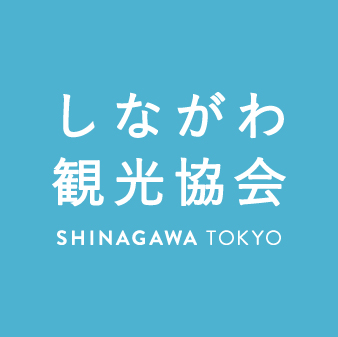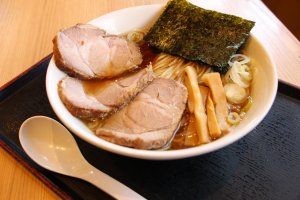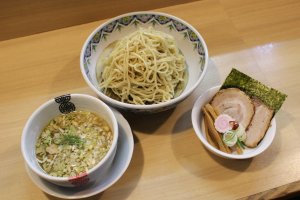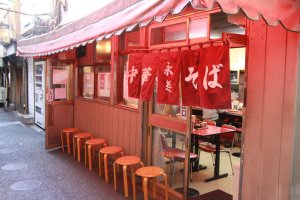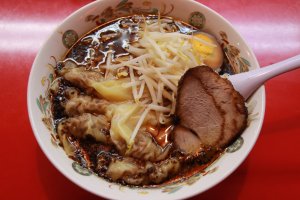When you think of Japanese cuisine, ramen is likely one of the first foods that comes to mind.
This renowned dish is one of Japan’s leading comfort foods and has spread well past its borders—touching people globally with its addicting flavors. As an integral part of Japanese gastronomy, ramen has become well intertwined in everyday life—from salaryman lunches to after-clubbing breakfasts. Even on an average weeknight, the dish always makes for a quick, yet flavor-packed meal.
With ramen’s diverse range of broth varieties, toppings, noodle types, and regional specialties you will never tire of this national favorite. Tokyo alone is home to thousands of ramen restaurants serving everything from umami-rich tonkotsu to soupless tsukemen.
For an authentic slurp of noodles, start your ramen journey in Shinagawa City, located south of central Tokyo. This city is best known as a transportation hub, and due to the heavy commuter foot traffic, is packed with multiple hotels, offices, and—you guessed it—ramen restaurants. The bayside city is an excellent place to eat like a local.
First, Let’s Define Ramen
Originating in China, ramen noodles made their way to Japan in the early 1900s and are said to have started in Tokyo at a restaurant in Asakusa. While Japan was already home to popular noodle dishes, such as soba and udon, the Chinese-style noodle offered something new thanks to its inclusion of kansui—an alkaline solution that gives the noodles their bouncy texture. Later, during and after WWII, ramen further solidified its place in Japanese cuisine when the country’s wheat consumption rose in response to poor rice harvests. Ramen shops and stalls opened all over the country with local variations, and in 1958, Momofuku Ando invented instant ramen noodles to combat Japan’s rice shortages. Since then, ramen—both fresh and instant—has evolved into a versatile dish that people savor around the world.
Types of Ramen

Simply put, ramen can be divided into four categories—miso, shio (salt), shoyu (soy sauce), and tonkotsu (pork bone stock). Typically, aside from tonkotsu, ramen has a chicken or seafood-based broth and is topped with a range of ingredients based on a region’s or shop’s speciality. Some popular toppings across Japan include corn, seafood, chashu (braised pork), bamboo shoots, bean sprouts, pickled ginger, soft-boiled eggs, green onions, and nori (seaweed). No matter the time of day or year, ramen’s flavorful broth, chewy noodles, and delicious toppings always makes for the perfect bite.
Ramen Tips and Etiquette in Japan

As you savor this culinary masterpiece in Japan, please keep the following points in mind.
- Eat quickly and do not linger: Given the dish’s popularity, it is no surprise that ramen restaurants are often packed during meal times. Therefore, it is customary for guests to eat their ramen quickly and leave shortly after finishing so the next person can enjoy their own bowl of ramen.
- Use a vending machine: To achieve optimal efficiency, many ramen restaurants have vending machines where guests order and pay for their meals before sitting. After you select your ramen and toppings of choice, the machine will print out a ticket. Hand this ticket to the chef, and in a matter of minutes, you will have a steaming bowl of ramen.
- Slurp your noodles: Slurping noodles is not considered rude in Japan. In fact, slurping is the standard way to eat ramen!
Ramen Spots in Shinagawa
Now that you understand ramen on a deeper level, you may be wondering where to go next. Given its massive size, choosing a place to eat in Tokyo can certainly be overwhelming. Fortunately, we have you covered! Listed below are some of Shinagawa’s most delicious ramen restaurants.
Eiraku
Nostalgic ramen imbued with traditional flavors

Located just outside Oimachi Station, Eiraku is a Chinese restaurant renowned for its homey atmosphere and traditional flavors. The family-owned restaurant was established in 1953 and is presently owned by the founder’s grandson.

The restaurant’s classic ramen features a rich broth with flat noodles topped with bean sprouts, hard boiled eggs, and roast pork pickled in a special sauce. Aside from ramen, Eiraku also sells other dishes such as wontons, freshly made gyoza, soba, and fried rice. Most of the dishes cost less than 1,000 yen, making Eiraku not only a delicious, but an affordable place to eat! As the restaurant is a favorite among locals, it often has long lines during meal times.
Business Information
Address: 5-3-2 Higashioi, Shinagawa City, Tokyo
Business hours: Tuesday–Friday: 11:30-22:00; Saturdays, Sundays and public holidays: 11:30-21:00
Closed: Mondays and the third Tuesdays
Sharin Kitashinagawa
Addicting tsukemen that will impress all ramen lovers

Sharin, situated a short one minute walk from Shimbamba Station’s North Exit, is a restaurant that specializes in tsukemen—a type of ramen in which cold noodles are served with a separate bowl of broth for dipping. The dish is an excellent alternative to traditional ramen in the summer when you do not want to eat a hot bowl of soup. Given its close proximity to the station, Sharin is a popular place among businesspeople and locals alike!

The restaurant’s broth is a savory combination of pork and chicken stock and has a light flavor despite its deep taste. The noodles are thicker than typical ramen noodles and offer a satisfying chew. With seven types of Tsukemen to choose from, Sharin has something for everyone. Enjoy toppings such as bamboo shoots, roast pork, green onions, and seaweed, as well as chili pepper, Japanese pepper, and yuzu powder! The classic tsukemen is reasonably priced, and for an additional fee, you can even add more noodles to your liking.
Business Information
Address: 2-15-6 Kita-Shinagawa, Shinagawa City, Tokyo
Business hours: Monday–Sunday: 11:00-LO 22:30
URL: http://www.tsukemen-sharin.com
Bum Bun BLau Cafe with BeeHive
Unique ramen with natural ingredients and shaved ice

For a unique ramen experience that combines modern vibes with traditional flavors visit Bum Bun BLau Cafe, located about a one-minute walk from Hatanodai Station. The restaurant features a trendy interior and is famous for its ramen and kakigori (shaved ice) course. In addition to its local reputation, the shop has also earned three Bib Gourmands at the Michelin Guide Tokyo.

With its focus on natural ingredients, Bum Bun BLau Cafe sells a variety of special dishes, including White Truffle Salt Ramen, which has salt from Okinawa and ramen noodles made with the superfood, spirulina. At the end of your meal, enjoy some refreshing kakigori.
Business Information
Address: 2-7-3 Hatanodai, Shinagawa City, Tokyo
Business hours: weekdays: 11:00-16:00 (LO 15:30), 18:00-20:00 (LO 19:30); Sundays and public holidays: 11:00-15:00
Closed: Mondays
*Please check their SNS page before visiting
Tagano
Ramen restaurant with a long queue

Situated just outside Ebara-Nakanobu Station, Tagano is a renowned restaurant that has been serving ramen and Chinese soba for over 20 years. Thanks to its mouthwatering menu, the spot has even earned four Bib Gourmands in the Michelin Guide Tokyo. The bustling restaurant was established by a housewife in 1996 and focuses on simple, yet addicting flavors.

The eatery uses a combination of pork broth, chicken broth, dried sardines, and bonito flakes to create a complex, Japanese-style soup and even crafts homemade noodles! Tagano’s most popular dish is its Pork and Duck Tsukesoba, which comes with a light dipping sauce, chewy noodles, and tender meat. Add Tagano-don—a side of hot spring eggs, dried bonito, and chopped seaweed—to complete the meal. Due to its unparalleled flavors, the restaurant often has long lines during meal times and on weekends.
Business Information
Address: 2-15-10 Nakanobu, Shinagawa City, Tokyo
Business hours: 11:30-14:30
Closed: Wednesdays
URL: http://taganosoba.jimdofree.com/
Are You Hungry?
With its depth of flavor and range of variations, it is no surprise that ramen grew into an internationally loved food. In Tokyo, you can enjoy this dish everywhere at a reasonable price, making it highly accessible for tourists and locals alike. Try multiple types, and choose your favorite.
Happy slurping!
*Please note that the restaurants' business hours and offerings are subject to change.
